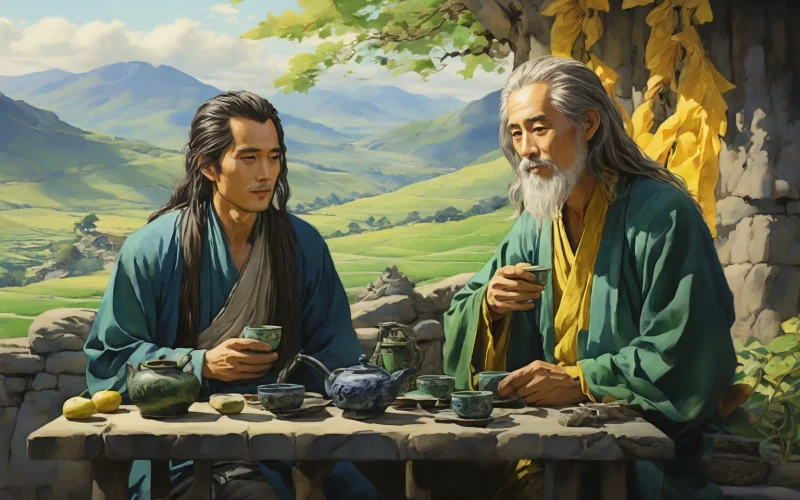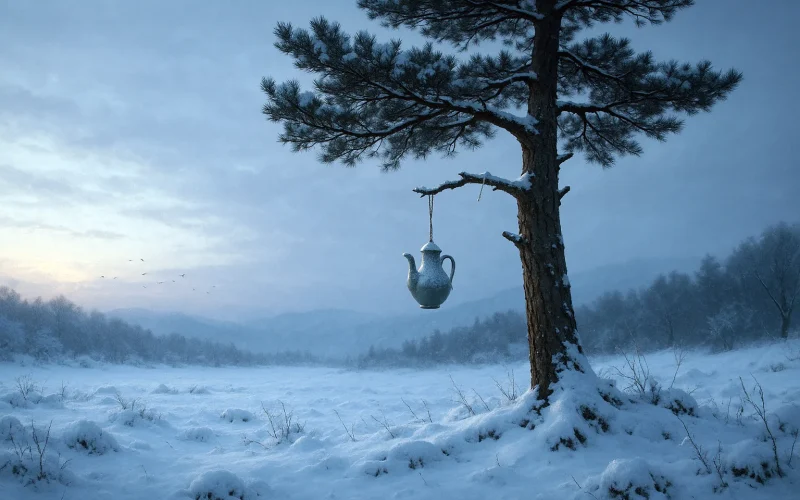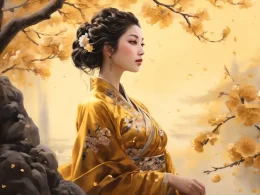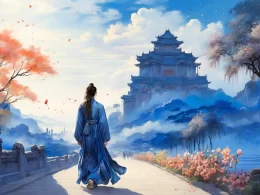Hearing a knock at dawn while still at rest,
I got up to open, not yet half dressed.
Asking the early comer, "Who are you?"
I saw a smiling farmer come in view.
He came to see me with a pot of wine,
Doubting if worldly offer I'd decline.
"You live in rags under a thatched roof.
But how can your cottage be riches-proof?
Since all the world is drifting with the tide,
Could you alone stand aloft and aside?"
I thank the farmer for his kind advice,
But it's my freedom I won't sacrifice.
Though I may learn to go official way,
To do against my will, can I not stray?
Let us rejoice at drinking the cup dry!
I won't go backward as the days go by.
Original Poem
「饮酒 · 其九」
陶渊明
清晨闻叩门,倒裳往自开。
问子为谁欤?田父有好怀。
壶浆远见候,疑我与时乖。
褴缕茅檐下,未足为高栖。
一世皆尚同,愿君汨其泥。
深感父老言,禀气寡所谐。
纡辔诚可学,违己讵非迷?
且共欢此饮,吾驾不可回。
Interpretation
Composed around 416 AD after Tao Yuanming's retreat to rural life, this poem belongs to his series "Twenty Poems on Drinking." It depicts a well-meaning farmer's visit to persuade the poet to abandon reclusion and conform to worldly norms. Through their simple, natural dialogue, Tao expresses gratitude for the farmer's concern while steadfastly maintaining his commitment to spiritual integrity, revealing his noble character and unshakable principles.
First Couplet: "清晨闻叩门,倒裳往自开。"
Qīngchén wén kòu mén, dào cháng wǎng zì kāi.
At dawn I hear knocking—clothes half-on, I hurry to unlatch.
This spontaneous response illustrates the unpretentious relationship between host and visitor, embodying rural life's sincerity and the poet's natural hospitality.
Second Couplet: "问子为谁欤,田父有好怀。"
Wèn zǐ wéi shéi yú, tián fù yǒu hǎo huái.
"Who comes?" I ask—a kind farmer's visit this be.
The farmer's arrival, motivated by genuine concern, reflects the authentic human connections of countryside living.
Third Couplet: "壶浆远见候,疑我与时乖。"
Hú jiāng yuǎn jiàn hòu, yí wǒ yǔ shí guāi.
Bearing wine from afar, he fears I've strayed from time's flow.
The farmer's purpose emerges: to counsel against reclusion and urge realignment with contemporary norms.
Fourth Couplet: "褴褛茅檐下,未足为高栖。"
Lánlǚ máo yán xià, wèi zú wéi gāo qī.
"This ragged thatch can't suit one of your worth," he sighs.
With rustic candor, the visitor questions the poet's choice of impoverished seclusion over worldly engagement.
Fifth Couplet: "一世皆尚同,愿君汩其泥。"
Yīshì jiē shàng tóng, yuàn jūn gǔ qí ní.
"The age prizes conformity—why not muddy your feet?"
The farmer's metaphor urges the poet to compromise ideals for social harmony, representing conventional wisdom.
Sixth Couplet: "深感父老言,禀气寡所谐。"
Shēn gǎn fùlǎo yán, bǐng qì guǎ suǒ xié.
"I value your advice, but my nature fits ill with the crowd."
Tao responds with gentle firmness, acknowledging the counsel while asserting his innate incompatibility with worldly ways.
Seventh Couplet: "纡辔诚可学,违己讵非迷?"
Yū pèi chéng kě xué, wéi jǐ jù fēi mí?
"Though bending may be learned, is self-betrayal not folly?"
This philosophical rebuttal elevates the dialogue, equating conformity with spiritual loss. The rhetorical question underscores Tao's conviction.
Eighth Couplet: "且共欢此饮,吾驾不可回。"
Qiě gòng huān cǐ yǐn, wú jià bùkě huí.
"Let's share this wine instead—my path admits no return."
The closing couplet transforms refusal into communion, affirming present joy while declaring irreversible commitment to his chosen way.
Holistic Appreciation
The poem adopts a quasi-dialogue form, with characters appearing naturally and speaking intimately. Through brief exchanges with a village elder, the poet reveals authentic rural sentiments and the deeper choices within a recluse's heart. Progressing seamlessly from door-knocking greetings to advice-declining refusal, the narrative develops with natural fluency. While appreciative of the elder's concern, Tao Yuanming remains steadfast in his original aspirations, asserting that "going against oneself is true confusion" and "my carriage cannot turn back." These declarations manifest his rejection of worldly compromises and commitment to personal ideals. Beneath its plain language glows profound luminescence of character.
Artistic Merits
The poem's most striking feature is its "dialogue-as-poetry" technique, embedding worldly wisdom naturally within conversational exchanges to create vivid lifescapes. Its language remains unpretentiously warm, employing concrete imagery like "clothes hastily donned when answering the door" and "distant sight of wine offered in greeting" - seemingly mundane descriptions that convey rich emotions and philosophy. Exemplifying Tao's signature fusion of reason and emotion through economical expression, this work stands out for its masterful characterization and dialogic wisdom.
Insights
This poem teaches us to respond to well-meaning advice with gracious firmness, without forcibly conforming to societal norms. Life's value lies in honoring one's inner truth - when discordant with surroundings, better preserve authenticity than betray oneself for superficial harmony. Through gentle yet resolute tones, Tao Yuanming reminds us: true reclusion isn't escapism but spiritual choice, the courage to safeguard ideals and freedom.
Poem translator
Xu Yuanchong (许渊冲)
About the poet

Tao Yuanming(陶渊明), 365 – 427 CE, was a poet, literary figure, fu writer, and essayist active during the late Eastern Jin and early Liu Song dynasties. Born in Chaisang (near present-day Jiujiang, Jiangxi Province), he pioneered a new genre of pastoral-themed literature, expressing profound philosophical insights through simple language. His poetic style became an enduring aesthetic standard in classical Chinese poetry.











